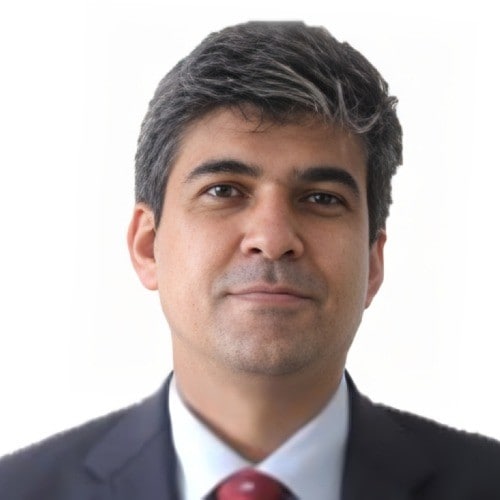{{item.title}}
{{item.text}}

{{item.title}}
{{item.text}}
15-minute read
The spike in family offices in India parallels the country’s economic growth. Falguni Shah and Jayant Kumaar trace the evolution of family offices from wealth preservation and management units to structured entities focused on impactful and responsible investing.
The Indian economy is on a roll. Contributing to its expansion are family businesses, both large conglomerates and small-to-medium-sized enterprises, spanning sectors such as manufacturing, retail, real estate, healthcare and finance. Accounting for 60–70% of the country’s GDP,1 there are those that have consistently maintained an upward trajectory through strategic planning and acquisitions, diversification, organic product portfolio expansion and visionary leadership – all attributable to the family office.
Such family offices have catalysed the creation of jobs, entrepreneurship and a culture of self-reliance in the country, unlike those that have gone south owing to a lack of adaptability, succession planning, innovation, and effective governance.
Today, the family office has come a long way – from being an enabler boosting the financial wealth of families to building a resilient family enterprise; from supporting the family’s long-term goals by adopting an integrated strategy to being the custodian of the entire governance model, including the implementation of the family constitution and next-gen training. Currently, there are over 300 family offices in India, as against 45 in 2018,2 and the number is set to rise exponentially,3 with promoters building impressive businesses in Tier 2 and Tier 3 cities.4
With this evolution of family offices, the more affluent families are now seeking sophisticated wealth management solutions and newer investment strategies even as the need for succession planning weighs heavily on ultra-rich Indians, many of whom happen to be first-generation entrepreneurs.5 Diversification and deployment of new capital allocation strategies, assets such as real estate, and new ventures having adjacencies to the current strategic focus are also on their radar. It is therefore worth examining the current trends, challenges and solutions family offices have on offer.

Amarjeet Singh Makhija
Partner and Unicorn and Start-up Leader, PwC India
“Family offices have been investing in the startup ecosystem as a separate asset class for some years now. However, most of the investments are made and managed by such family offices as a passive investor: usually as a follow-up round with friendly VCs. However, the opportunity in this asset class in India is massive and family offices can play a more critical role. They can be mentors to young entrepreneurs and at the same time learn the art of innovation from them. A well-balanced portfolio of investments can give them disproportionate returns and learnings for their existing businesses.”

Bhavin Shah
Partner and Private Equity and Deals Leader, PwC India
“Indian family offices are keenly looking at diversifying their investments across asset classes (including real estate, debt, public equity, startups and other alternative investment products). They are also looking at investing in other geographies to gain exposure to various currencies, thereby mitigating currency risk. Geographical diversification is partly driven by the desire of the younger generation to study and settle abroad, which has led to families aiming to create a corpus for the next generation in other countries.
Further, as families become large, family governance, constitution and succession planning have become more critical than ever before. Without a clear structure and a set of guidelines, conflicting interests may lead to rifts within the family which could destroy the value of family-owned businesses. With family offices playing an increasingly important role beyond just wealth management, it would be interesting to watch their evolution and contribution to the overall development and maturity of the business and financial landscape in India.”

Annu Gupta
Chartered Accountant
“The family office goes far beyond mere wealth management. It requires a holistic approach, binding family members with a common purpose and values that spur them on to take forward the business collaboratively.
It also involves grooming key talent so that they grow into strategic institutional members who can drive business growth. Moreover, it entails putting together a central repository of family legacy, chronicling examples of past generations’ hard work and crisis management that paved the path to success. It brings together family members through retreats, events and storytelling to discuss and find solutions to challenging issues.
The family office also plays a crucial role in preparing the next generation, making them feel connected to their roots, and nurturing the abilities of individual members to have them realise their full potential and emerge as their best versions.
It embodies six core qualities to be cultivated – legacy preservation, unity and purpose, wealth stewardship, relationship building, adaptability and innovation, and talent development.”

Rajesh Vig
Partner – Deals, PwC India
“The rising influence of family offices underlines the evolving wealth management and financial advisory services landscape in India. Over the last few years, family offices have secured an integral spot in India’s financial ecosystem, offering specialised services catering to the unique and complex requirements of high-net worth individuals and business families.
A wide range of factors have influenced the growth of family offices in India, including a spike in the ultra-high net worth population, focus on wealth transfer down generations, global nature of assets and the growth of ‘impact investing’, which denotes combining social and environmental goals with financial returns.
By their nature, family offices are uniquely positioned to facilitate all the above asks. Going forward, it is crucial for family offices to keep adapting to the evolving investment landscape, given the changing market conditions and emergence of new asset classes.
This is also intrinsically connected to the ability to hire the right professionals, for which family offices need to show some creativity in developing hiring and retention strategies so as to onboard the right workforce, with the required domain and sectoral knowledge to ensure longevity and success.”
Family offices are transforming into one-stop solutions, offering a wide range of services beyond wealth management. They provide professional guidance on compliance, legal issues, taxation, investment strategies, and strategic decision making. This trend helps families streamline their operations and achieve their long-term goals.
A family office in India that exemplifies this trend goes beyond traditional wealth management and offers a comprehensive range of services, including professional guidance on compliance, legal matters, taxation, investment strategies, and strategic decision making, to meet the diverse needs of the family. In addition, it focuses on philanthropy and social impact initiatives, engaging in charitable activities and supporting various healthcare and education projects in India.
Family offices are increasingly investing in startups, diversifying their portfolios, and seeking higher returns. They are shifting from traditional investments to strategic risk mitigation and exploring opportunities in emerging markets. Among Indian family offices, FinTech is a key attraction that raised a total funding of USD 853.6 million in CY23.6 Indian family offices are also setting up offices abroad to tap global investment opportunities.
One such Indian family office has made several strategic investments in the Indian startup ecosystem, seeking out promising startups with innovative business models and disruptive ideas. It provides financial support, mentorship and guidance to help these startups scale and succeed. Its international presence also enables it to identify and invest in startups with global potential, and explore the potential of emerging markets.
Family offices in India are slowly adopting emerging technologies such as artificial intelligence (AI), machine learning and data analytics to optimise their investments, enhance operational efficiency, and improve decision making. Recognising the potential of technology to transform family office operations, the next generation of business leaders is driving this trend. There is a laser focus on digitising operations with more sophisticated wealth management software and tools that reduce people dependencies and also offer business intelligence (BI) dashboards and real-time data for family members. This enables them to make more informed decisions around investments and asset management.
In India, while there are some family offices that have been slow on tech uptake, on the flipside, there are also those that have been using advanced algorithms and predictive models to analyse market trends, identify investment opportunities, and manage risks effectively.
Wealthy families are expanding their investment horizons beyond domestic markets. They are diversifying their portfolios, accessing global opportunities and embracing a global citizenship mindset. This trend reflects the dynamism and adaptability of wealth management strategies in response to the evolving economic landscapes.
A wealthy family office in India has gone global by expanding its investment horizons across various industries such as automotive, steel, telecommunications and hospitality. This expansion has allowed the group to diversify its portfolio and access global opportunities.
Family offices are increasingly aligning their investments with environmental, social and governance (ESG) factors. They are focusing on impact investments that generate both financial returns and positive social outcomes. This trend reflects a growing emphasis on sustainability and social responsibility.
An example of responsible investing by a family office in India is the corporate social responsibility (CSR) arm of one of the largest public sector banks in India. The foundation supports various initiatives in areas such as education, healthcare, rural development and women empowerment, and focuses on impact investments that generate positive social outcomes while also considering environmental and governance factors.
Navigating the complexities of intergenerational wealth transfer and balancing risk with rewards while diversifying investments, family offices therefore have their work cut out for them amidst the following challenges.
Both among family members and within the family office itself, building trust is at a premium. The reasons could range from complex family dynamics given that there would be members with different mindsets, interests and priorities, which could lead to friction, and a lack of open communication that hinders trust building. In addition, as the involvement of a family office introduces professionalism, this also tends to create a perceived power imbalance, further complicating trust-building efforts.
Many family offices struggle with effective succession planning and establishing robust governance structures. While 9 out of 10 publicly traded companies in India are family owned or controlled,7 only 63% of Indian family business leaders say they have formal governance structures in place, including shareholder agreements, family constitutions and protocols, and even wills.8 Business owners, however, acknowledge that protecting the business, growing it and passing on the legacy to the next generation are key long-term goals.9 But lack of clear leadership transitions, decision-making processes, and governance frameworks can hinder the smooth transfer of wealth and create conflicts within the family.
Family offices often lack defined processes to measure performance and define success. Establishing KPIs allows family offices to align their priorities with the family business’s goals, track performance and make necessary improvements. Financial activity, liquidity, and non-financial indicators such as family engagement and cohesion, reputation and brand perception, and managing safety and privacy risks could also be used to assess performance.
Family offices face various risks, including cybersecurity threats, regulatory compliance, privacy concerns and reputational risks. It has been reported that four in 10 family offices globally have deployed cybersecurity controls, but most end up being the targets of cyberattacks, some of them multiple times. The need of the hour is to have a comprehensive approach to risk management and adopt cybersecurity measures, information security and emerging technologies such as AI for policy updates, cyber defence and reviews.
Attracting and retaining skilled talent, especially in the fields of investment strategies and wealth management, is often an uphill task for family offices. To navigate fierce competition and retain talent, family offices need to set themselves apart by distilling family values into a recognisable people value proposition that factors in fresh talent avenues, work flexibility and competitive salaries.
To set up a family office a one-size-fits-all approach isn’t viable; each family office is to be tailored to suit the structure, services, scale and team that the family and businesses require for their specific stage of evolution, and each will be faced with a different set of challenges to be resolved based on its individual maturity level.
Even as family offices in India are on a transformative path, driven by a confluence of innovation and tradition, they still have a long way to go. The landscape is evolving, from a renewed interest in legacy planning and intergenerational wealth transfer to a heightened focus on sustainable investing and impact-driven initiatives. Besides, there is a pivot towards direct investments in sectors that are poised for growth – such as healthcare, technology and renewable energy.
Additionally, there’s growing recognition of the importance of professionalism and governance within family offices, as they seek to adapt to a changing regulatory environment and global market dynamics. As stewards of wealth, Indian family offices are not just shaping their financial legacies, but also embracing their responsibility to drive positive change for future generations and society at large.
Moving forward, given the emergence of new asset classes and changing market conditions, adapting to the evolving investment landscape will also be key to holding one’s ground. Also, with an ever-changing regulatory environment, and with new compliance requirements and tax structures emerging across jurisdictions, the adaptability of family offices in addressing these complexities through innovation and technological solutions will be key to their remaining relevant and effective in their role as custodians of generational wealth and beacons of trust.

